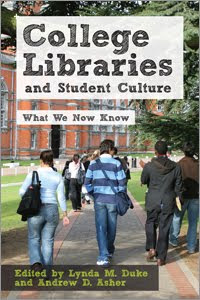Neuroscience

- Working With Students, Non-traditionally
I've branched out into non-traditional librarian-student interaction, and it's been a great success. This spring, I collaborated with JOMC professor Spencer Barnes and his Infographics students. Dr. Barnes asks the students to create (amazing)...
- My Library Life, Last Week
Once again, I participated in #libday8, a semi-annual event coordinated by Bobbi Newman of Librarian by Day. Twice a year librarians, library staff & library students share a day (or week) in their life through Twitter & other...
- More Library Instruction Or Better Database Interfaces?
My librarian friend Emily Alling recently posted a question on Facebook asking if you were the head of a reference department: which should / would get more priority, more instruction on how to use library resources, or better interfaces for those resources?...
- Public Library Marketing Toolkit
ProQuest & CSA have come out with a terrific public library marketing toolkit that could benefit ALL libraries. It includes some great material that savvy librarians can use to publicize their offerings, and not just those from ProQuest / CSA (tho'...
- Real Life Librarian Blogs
These two blogs are great for prospective reference librarians – they tell what reference library work is really like, as opposed to sources and formal reference theory which is what I teach at Simmons. Both have graciously allowed me to use their experiences...
Neuroscience
College Students @ the Library

A recent ethnographic study assessed how college students use the library for research projects and study needs. The results are worth your time to read if you expect students to do library research: basically, students rarely ask librarians for help.
USA Today summarized the study in August (College students rarely use librarians' expertise), and here's my summary of their summary.
The ERIAL (Ethnographic Research in Illinois Academic Libraries) project was a 2-year, 5-campus ethnographic study on how students use their campus library.
The researchers found that students "tended to overuse Google and misuse scholarly databases" -- they didn't understand sources (neither Google nor library databases), nor did they know how to find good articles.
Worse — in my view — when students went to use a library database, 50% of them used databases that a librarian "would most likely never recommend for their topic." (I've experienced this myself). Students "showed an almost complete lack of interest" in getting help from a librarian — despite all of the above.
Instead, students consult with faculty who:
- Tended to overestimate students' research skills
- Didn't require a visit to the library to start their research
- Had low expectations of librarians
- Had a sometimes limited ability to teach students effective search strategies and resources
The study also notes that it is difficult for faculty and librarians to put themselves in the place of undergraduate students who don't know how to do library research. No library theory of mind here!
My prior reading of the library literature suggests that the best way to overcome students' disinclination to use the library is for faculty to require them to use the library as part of their research. Students are more willing to follow faculty suggestions than anything else regarding library use, so if you require them to consult with a librarian, they are more likely to do so. This is particularly true, other research suggests, for students of color.
If you want your students to improve their research and use better articles in your classes, please encourage them to visit one of the libraries on campus. Better yet, ask your subject librarian to come to class and work with your students as a group to improve their library research. I consistently hear from my faculty colleagues that my sessions improve the quality of articles students find, so having a librarian speak formally to classes is A Good Thing.
For More Information
- Kolowich, Steve. “Study: College Students Rarely Use Librarians’ Expertise."USA Today Online Aug. 22, 2011.
- Duke, Lynda. College Libraries and Student Culture What We Now Know. Chicago: American Library Association, 2011. Information @ ALA.org or borrow through WorldCat.
- Working With Students, Non-traditionally
I've branched out into non-traditional librarian-student interaction, and it's been a great success. This spring, I collaborated with JOMC professor Spencer Barnes and his Infographics students. Dr. Barnes asks the students to create (amazing)...
- My Library Life, Last Week
Once again, I participated in #libday8, a semi-annual event coordinated by Bobbi Newman of Librarian by Day. Twice a year librarians, library staff & library students share a day (or week) in their life through Twitter & other...
- More Library Instruction Or Better Database Interfaces?
My librarian friend Emily Alling recently posted a question on Facebook asking if you were the head of a reference department: which should / would get more priority, more instruction on how to use library resources, or better interfaces for those resources?...
- Public Library Marketing Toolkit
ProQuest & CSA have come out with a terrific public library marketing toolkit that could benefit ALL libraries. It includes some great material that savvy librarians can use to publicize their offerings, and not just those from ProQuest / CSA (tho'...
- Real Life Librarian Blogs
These two blogs are great for prospective reference librarians – they tell what reference library work is really like, as opposed to sources and formal reference theory which is what I teach at Simmons. Both have graciously allowed me to use their experiences...
